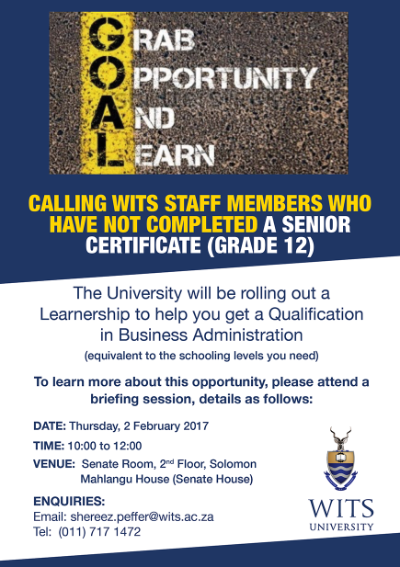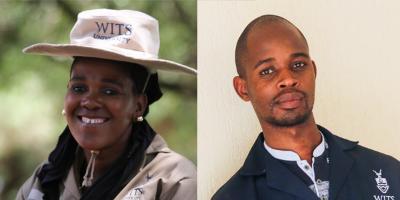Wits welcomes insourced workers
- Wits University
There was a lot to celebrate when the first cohort of insourced workers reported to work as official Wits employees in January 2017.
Fana Sibanyoni, Wits’ Chief Operations Officer, says: “The commencement of the insourcing programme is both the end of a long engagement process and the beginning of a new era at Wits. It is recognition that workers should have access to the dignity, security and conditions of service befitting our institution.”
Insourcing at the University commenced at the beginning of 2017. This followed protests which highlighted a range of transformation issues including the end of outsourcing. Wits initiated outsourcing in 2002 when it appointed external companies to provide cleaning, catering, transport, gardening services etc.
In response to the calls to end outsourcing, the Wits Council approved the establishment of an Insourcing Task Team comprising workers, students, academic staff, management, and council members. After months of robust debate, a policy was finalised, proposed to Council and agreed in June 2016. A management implementation task team was appointed to renegotiate existing contracts, set up the HR systems and induction and training programmes for the new Wits employees.
Other previously outsourced groups of workers will join Wits as employees during the course of 2017. Services to be insourced are cleaning, catering, security, transport, waste, grounds and landscaping. This amounts to approximately 1530 workers.
The insourcing and improvement of worker wages has been life-changing for Wits workers. The first changes were implemented in January 2016 following discussions by the Insourcing Task Team. The University absorbed the costs of the difference in the salaries paid by the outsourced service providers by paying a ‘top-up allowance’ to meet the agreed minimum wage. The salary of outsourced workers who earned below the minimum wage was increased to R4500 in January 2016 and to R6000 for the period June to December 2016.
The commencement of insourcing brings a further increase set at R7 860 (cost to company) in 2017. The more than 100% increase in salaries for some workers represents a move in the right direction to address the inequality so obvious in South Africa today.
Life has changed for the better for landscaper Florence Mashaba, who is part of the first group to be insourced.
Mashaba is relieved that she can now provide the basics for her family, such as food, and provide stationery and replace ill-fitting school uniforms.
Salary improvements are not the only benefits that bring hope to the ‘new staff’.
Mashaba, who used to pick up pens and pencils on Wits’ grounds for her children, is now certain that her children will get a post-matric qualification. The children of previously outsourced workers will now be able to access quality higher education. Those who qualify to study at Wits will receive financial aid from the University, setting them on a new trajectory.
Caiphus Luvhengo is dreaming of a decent future. He is a popular figure at the Wits Parktown Management Campus where he is a general worker. He derives joy knowing that his efficiency contributes to the positive image of the School. Darting around the campus, he ensures that there are no delays to lectures due to poorly prepared teaching venues.
“Being insourced has placed me in a position where I can plan for my future,” he says.
Although he only recently began enjoying an improved income, the soon-to-graduate worker would like to build a home for his wife and four-year-old daughter.
“We have a 23-member stokvel on this campus started years ago by workers to pool money and buy things that we couldn’t afford on our own. I am going to use my pay out to purchase a stand for my home. My increased salary will go towards building our home,” he says.
Luvhengo’s spirit has been renewed and his dreams are within reach. He recently completed the New Managers Programme at the Wits Business School. It was his dedication and brilliance that caught the attention of Karl Wegner at the School, who motivated for Luvhengo’s admission into the programme.
Completing the qualification was a milestone for Luvhengo who did not get the chance to study after matric despite excellent results. As his graduation day draws closer, Luvhengo is grateful for the kindness of Wegner who realised his potential.
He aspires to be a facilities manager and use his experience to improve Wits. His advice to previously outsourced workers is to educate themselves so that they can progress.
“I plan to study further and better my position now that I am a Wits employee,” says Luvhengo.
The Human Resources Development Unit is rolling out basic training programmes that could serve as a gateway to further opportunities for staff.


